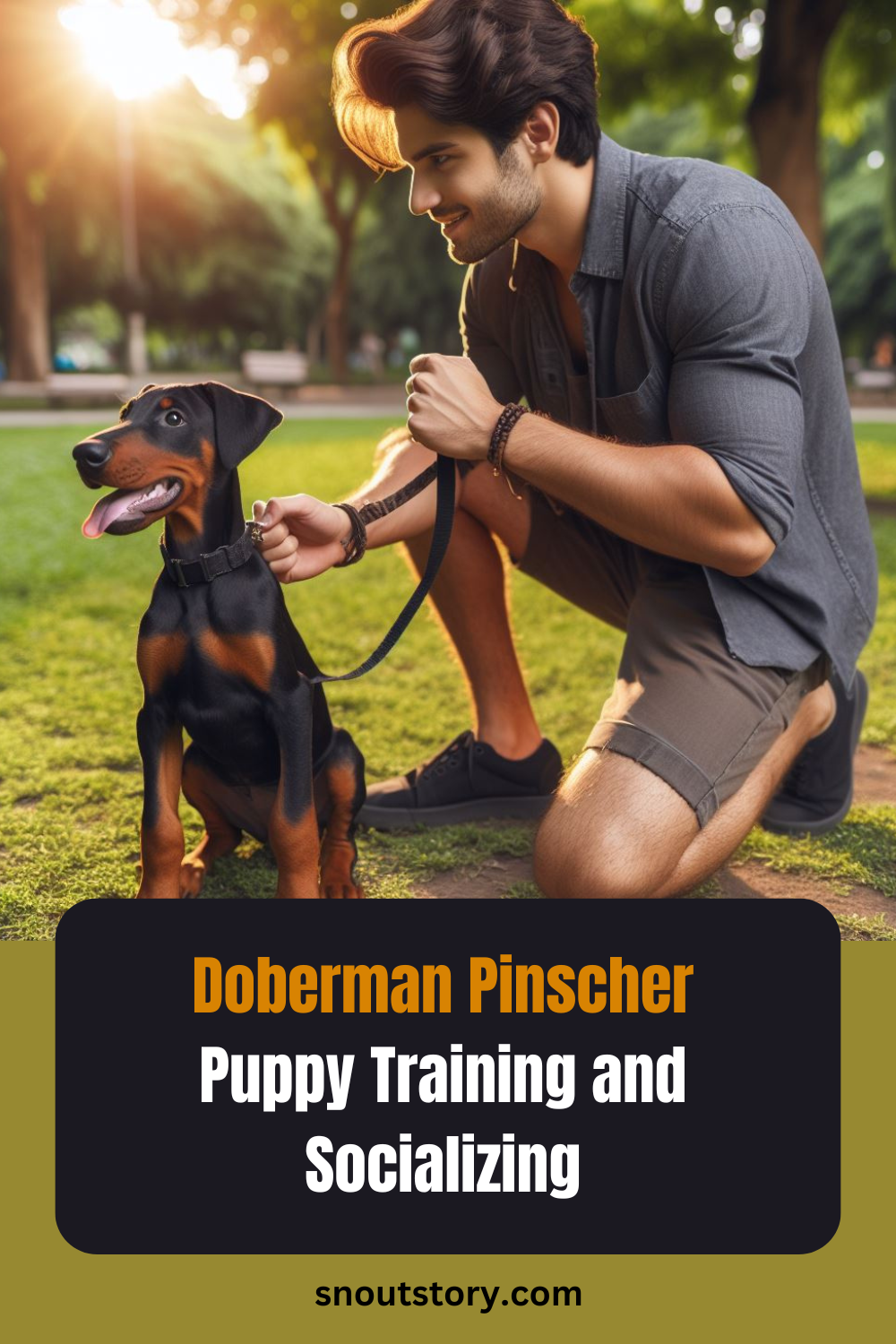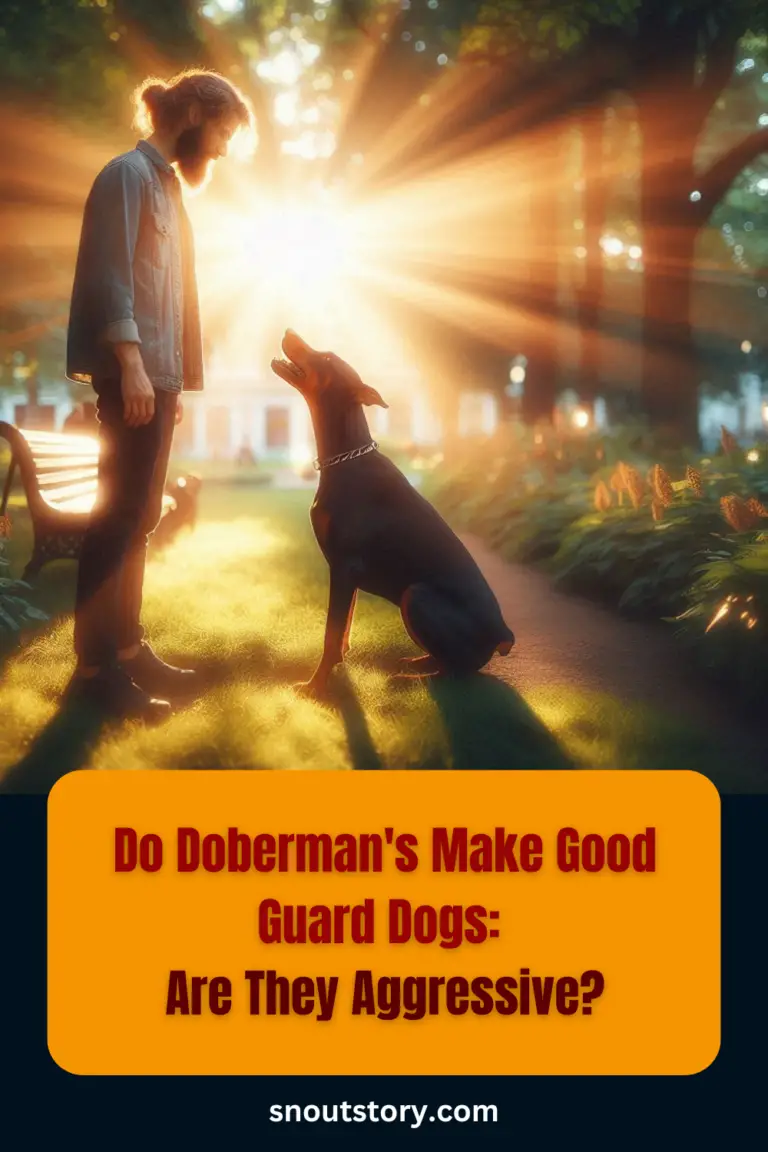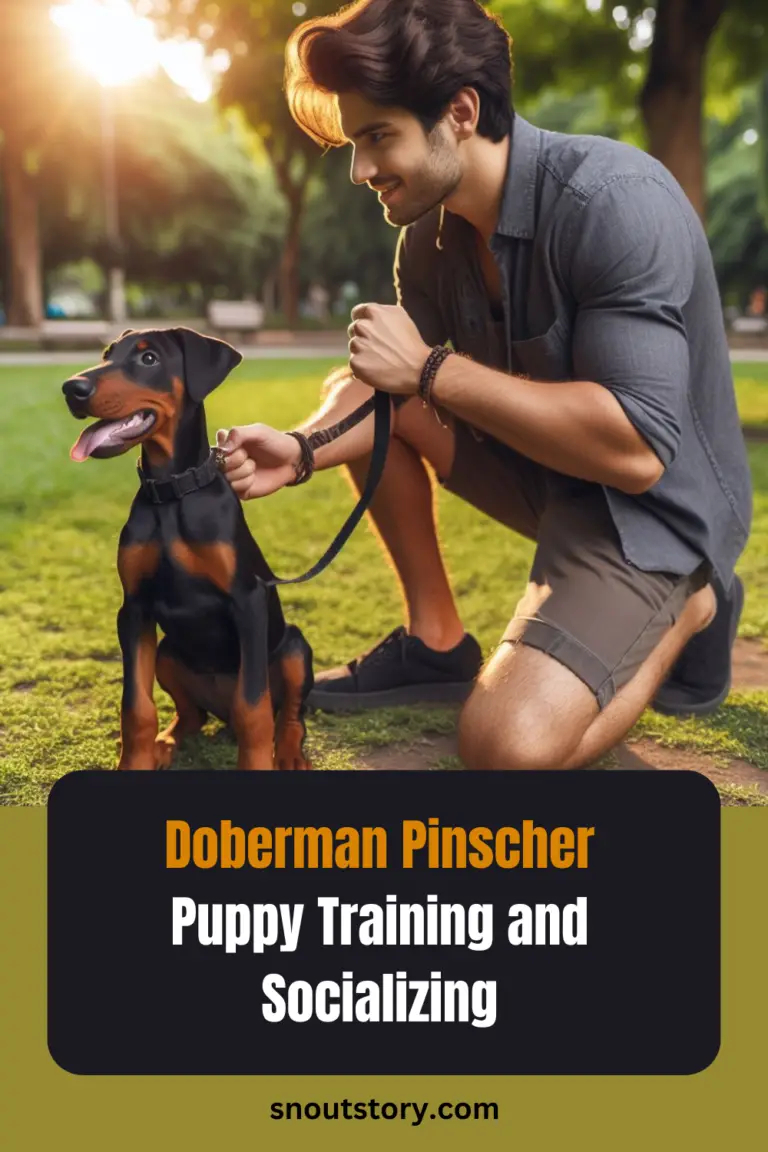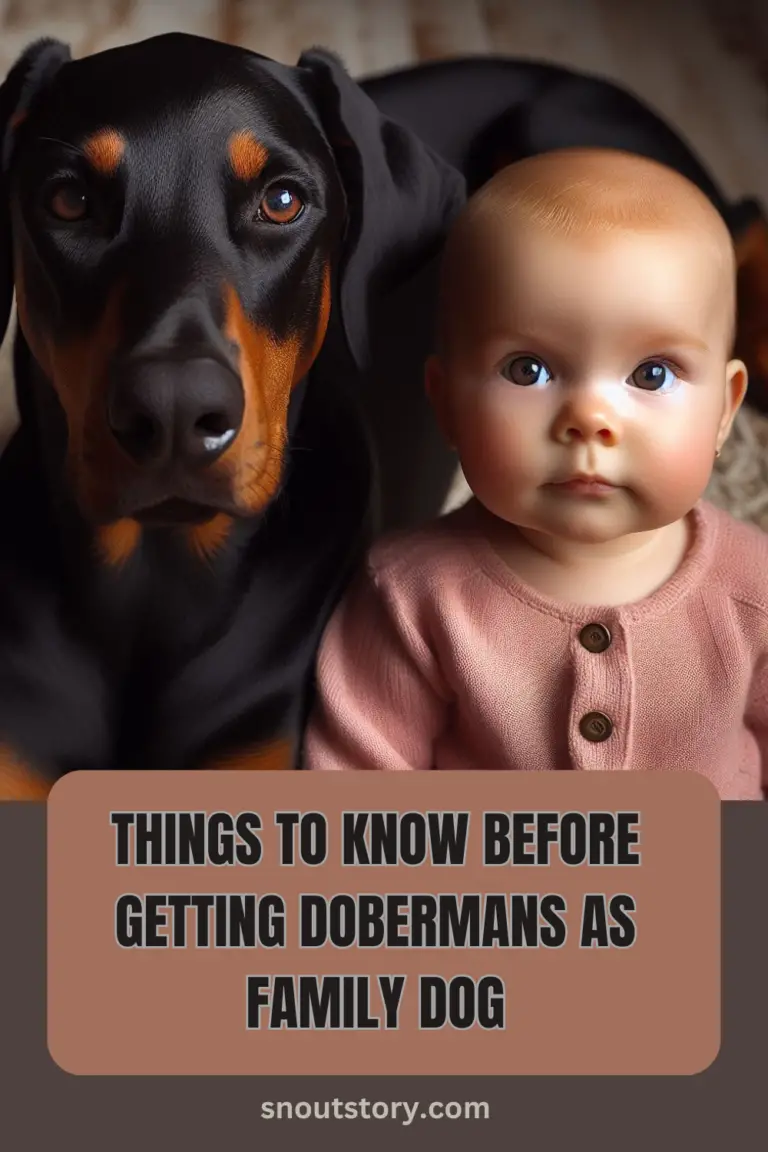Many people view Doberman Pinschers as inherently aggressive or difficult dogs. The truth is, with the right training and socialization, they become incredibly loyal and well-behaved companions. But how exactly can you train a Doberman puppy?
Training and socialization are crucial elements for any dog breed, but even more so for a powerful and intelligent breed like the Doberman Pinscher. Neglecting training can lead to behavioral problems like aggression and fearfulness.
Importance of socialization and training Your Doberman Puppy
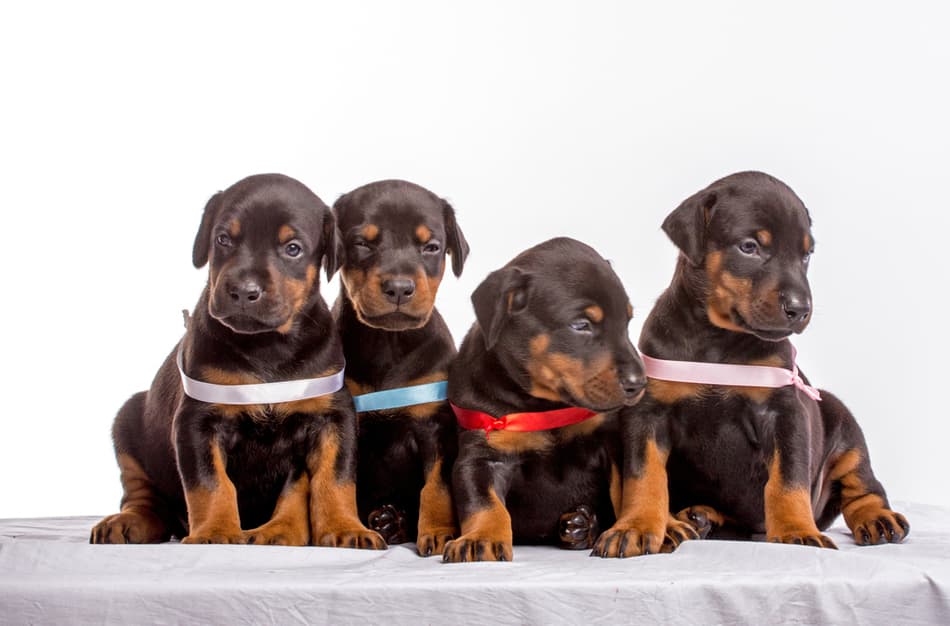
Training and socialization set the foundation for a well-behaved and well-rounded canine. They are not just two elements “nice to have” for your puppy. They are the cornerstone of raising a happy, confident, and safe dog. No matter the breed, the benefits of obedience dog training and socialization set clear guidance and exposure to the world.
Dobermans, renowned for their intelligence, strength, and alertness, were bred to be a working breed. They were bred to work and train. Because of their history, they have found a place in the military, police, and search and rescue operations.
Raising a Doberman puppy requires dedication, effort, and patience to help with obedience training. Without proper training, these dogs can be a challenge for the environment. Imagine a Doberman with protective, guarding instincts that is not well-behaved in public. Without proper socialization, an untrained and unsocialized dog is a potential flight risk to himself and others.
Risks associated with Not Training Dobermans
These risks apply to all dog breeds, but they are heightened when you have a large dog breed like the Doberman. A powerful dog that can overtake you is not something you want running around in public. Here are some risks associated with neglecting training.
1. Fearfulness: lack of exposure to the outside world can plant insecurity in your canine, leading to a dog that reacts out of fear, potentially biting or acting defensively.
2. Aggression: in case your dog’s strong protective instincts are not channeled, the dog may overreact to perceived threats and try to dominate the environment.
3. Uncontrollability: a large and powerful dog that doesn’t know basic obedience commands like sit, stay, down, and heel, becomes unruly and frustrating to live with.
What is your end goal?
The end goal with any dog, be it a Doberman Pinscher or any other breed is to unlock the best version of your puppy. That is the power of positive outcomes. What you get is the following:
1. Obedience: a trained Doberman understands expectations and responds joyfully to your commands and cues, making daily life smooth and safe.
2. Confidence: a well-socialized Doberman is comfortable navigating different situations, greeting people dogs, and showing off its playful side.
3. Bonding: training builds a strong and positive relationship between the puppy and its dog owner.
Puppyhood is the critical window when you need to socialize and train your dog. Usually, we say that training starts the first day you bring your puppy home. You do not have to wait for a week, two, or more to pass. Begin training the day you get your Doberman puppy.
During puppyhood, which is the period between three months and eight months, your dog is like a sponge. That means you should set boundaries, teach basic obedience skills, and socialize your puppy properly.
If you think you are not up to the challenge, you can always try some puppy socialization classes and ask for help from a professional trainer.
But the worst thing you can do is ignore socialization and training. When we talk about socialization, we talk about different types of positive exposure. That includes new people, places, sounds, and other dogs in a controlled environment and under safe conditions.
Challenges when training Doberman Puppies
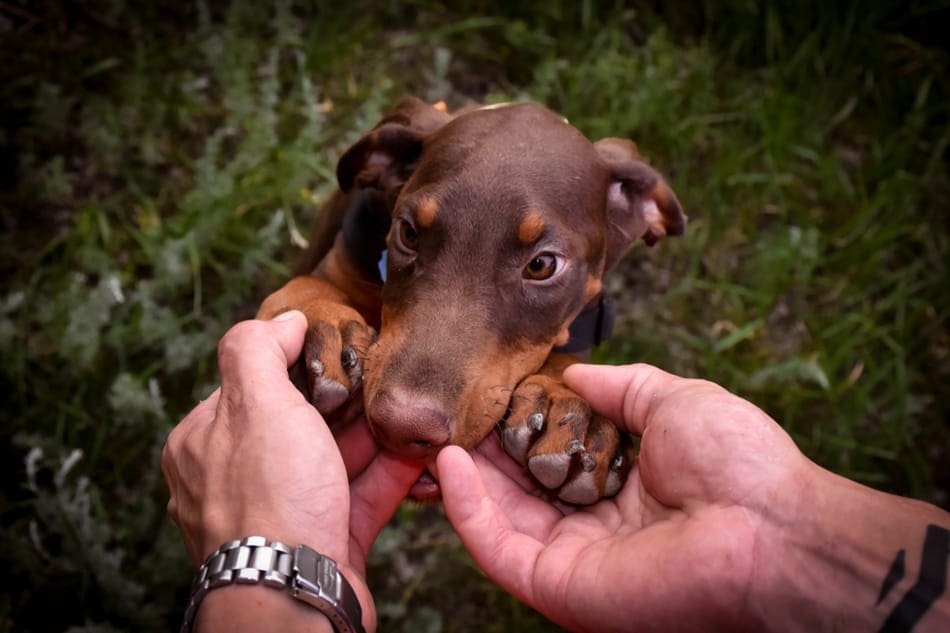
As I said before, Dobermans are working dogs. They are highly intelligent and among the top 10 smartest dogs in the world. And while a highly intelligent dog can be easier to work with, it can also be a challenge. Why? Because that dog might try to outsmart you. Here are some challenges pet parents face when training their Doberman Pinscher.
1. Due to their natural high prey drive, Dobermans tend to get lost.
2. Tireless workers need a job to do all day long. When they do not have a job, they become bored and eventually destructive.
3. Due to their large size and muscular build, Dobermans can be intimidating.
4. Because of their intimidating size and appearance, you might find it challenging for other people to want to greet your dog and interact with it.
5. Their big brain works 24×7, and if you do not provide enough mental stimulation, they will outsmart you.
6. Doing the same tasks over and over again will feel boring for your Doberman. You have to mix it up and add new challenges.
How to train Doberman Puppies?
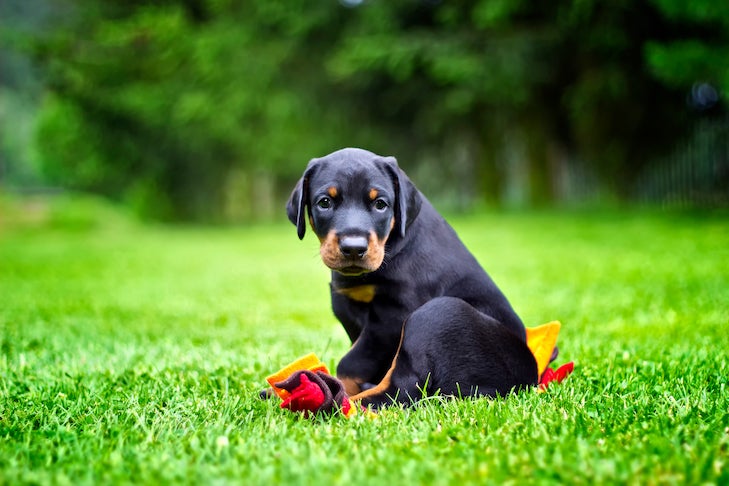
Dobermans, like most working dogs, respond best to positive reinforcement. You just have to find what motivates your dog. In most cases, that is food, or with some Dobermans, toys. Start with essential commands like sit, stay, come, leave it, heel, down, and more.
Here are some tips for how to best train a Doberman Pinscher:
1. Positive Reinforcement is Key: Dobermans respond best to positive reinforcement methods like treats, praise, and toys. This builds a positive association with training and keeps your dog motivated.
2. Keep it Engaging: Dobermans can get bored easily, so it’s important to keep training sessions short, fun, and varied. Use different exercises, toys, and locations to prevent boredom.
3. Consistency is Crucial: Dobermans thrive on consistency. Make sure you use the same commands and cues every time, and be consistent with your expectations.
4. Patience is a Virtue: Training takes time and patience. Don’t get discouraged if your Doberman doesn’t master a command right away. Keep practicing and rewarding positive behavior.
5. Address Exercise Needs: Dobermans are energetic dogs and need both physical and mental stimulation. Regular exercise helps them burn off energy and stay focused during training sessions.
Doberman Socialization Beyond Puppyhood
Dog training is a lifelong process. It doesn’t stop when your puppy reaches adulthood. You need to continue building your dog’s confidence and introduce your adult dog to new situations in a controlled manner.
If you notice signs of stress or anxiety in social settings, it might be good to take things back a notch. Take a step back, and then continue building up from there.
For some people, dog parks are a great place for socialization. For others, not too much. Dobermans are generally well-mannered dogs in a dog park. But if there are too many dogs and uncontrolled running, it might be better to pass it.
Recommended
8 Super-Foods to Ensure Your Doberman Lives a Long-Life
Do Doberman’s Make Good Guard Dogs – Are They Aggressive?
Do Dobermans Make Good Family Dogs? 8 Surprising Facts
Doberman Pinscher Puppy Training and Socializing (A Complete Guide)
Doberman Pinscher Size and Weight – Everything a New Owner Needs to Know
Doberman Pinscher Temperament and Traits – Everything New Owner Should Know
Aleksandar Mishkov is a 37-year old dog enthusiast. He has been living with dogs his entire life, and nowadays, he shares his life with a 6 year old Jack Russell Terrier, Milo. Visit Aleksander at his website The Daily Tail(https://www.thedailytail.com/) where he shares helpful tips on how to train and make
sure your dog behaves properly.

